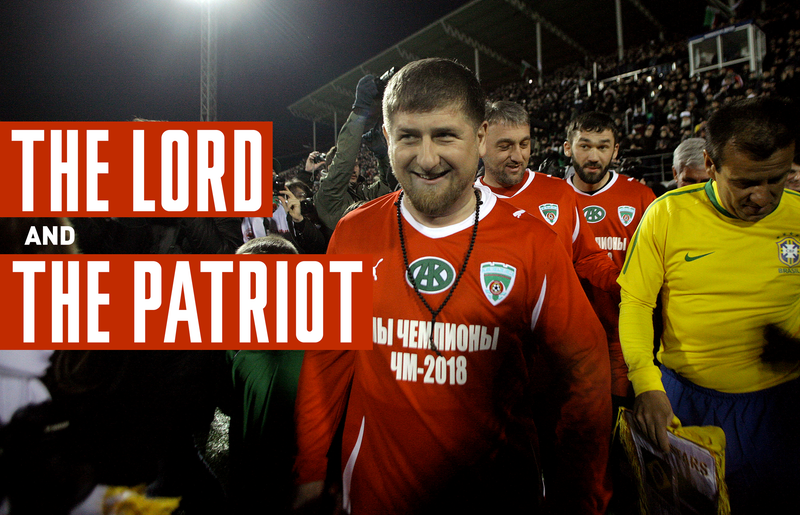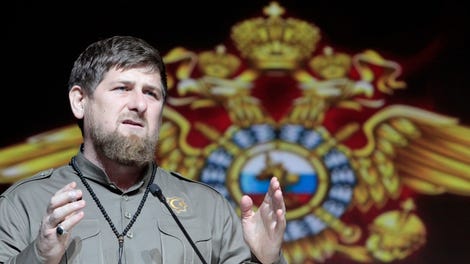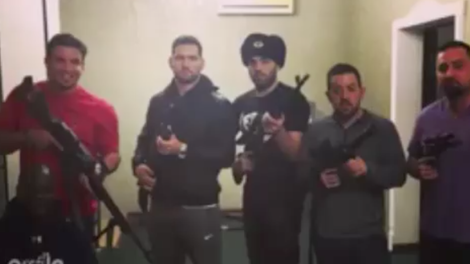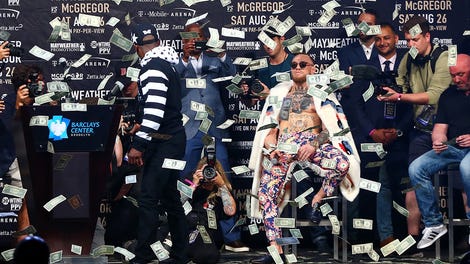
When Ramzan Kadyrov stepped into the Akhmat-Arena in Grozny on a brisk December morning in 2014, a sinister smile crept across his bearded face. Dressed in black, the longtime head of the Chechen Republic surveyed the scene within the country’s primary soccer stadium, where 20,000 soldiers dressed in fatigues stood in place of the sports fans who usually occupied the bleachers. Instead of the cheers and chants typical during matches, silence pierced the packed stadium. The Kadyrovtsy—an armed militia fiercely loyal to the man their army is named after—awaited instructions from their leader.
Standing alone on a stage erected overnight on the stadium’s well-groomed pitch, the strongman’s booming voice addressed his private army. “The time has come for us to make our conscious choice, and we say this to the whole world that we are the combat infantry of Vladimir Putin,” said Kadyrov, reciting a quote from a speech given by his father, Akhmad Kadyrov, in 2004 shortly before his assassination. A large screen projected images of Grozny from behind Kadyrov, while magnified images of his father and Putin were propped prominently on either side of him.
“We realize that there is the regular army in the country, the navy and the air force, but there are assignments that only volunteers can perform, and we will perform them,” Kadyrov added, seemingly placing his private army—considered an “illegal armed formation” by Russian opposition leader Alexey Navalny—in Putin’s service, likely as another demonstration of strength and loyalty to the Russian Federation. “Long live our great nation, Russia,” Kadyrov concluded. “Long live our national leader of Russia, Vladimir Putin. Allahu Akhbar! Allahu Akhbar! Allahu Akhbar!”
Kadyrov’s public spectacle was as concerning as it was revelatory. The speech emphasized his willingness to unleash a private militia at the Kremlin’s request, both domestically and abroad. The Kadyrovtsy, who reportedly assassinate journalists and dissidents at Kadyrov’s bidding, are considered a terrifying force. Their alleged crimes also include kidnapping, murder, and rape to enforce Kadyrov’s absolute rule through violence.
As the result of the wide autonomy and hefty budget granted to him by the Kremlin in exchange for the continuous suppression and pacification of the rebellious North Caucasus republic, Kadyrov operates Chechnya like his own personal fiefdom. While Kadyrov has transformed Chechnya’s capital, Grozny, into a miniature Dubai, complete with sparkly buildings and fancy restaurants, Chechens continue to suffer the wrath of his rule. Human rights and basic freedoms are considered unattainable luxuries. Within this repressive context, sports play an influential role in Kady. Sports are used as a tool to fabricate a sense of normality and distract from the ongoing abuse with the republic – an effective tool to maintain control of Chechnya.
Kadyrov’s display of military might within the Akhmat-Arena in late 2014 encapsulates his willingness to use sports, as well as their infrastructure, for political purposes. Grozny’s stadium, once dedicated to the beautiful game, had been temporarily transformed into a makeshift playground within which Kadyrov could rally his troops on a whim.
Kadyrov’s manipulation of sports stems from a longstanding tradition, typical of authoritarian regimes. Sports, in many forms, have long been used as instruments for diplomacy, as well as for control. The Chechen government has tightened control over the republic’s national sports as part of Kadyrov’s tyrannical rule, and have since used it to achieve political gains, project an image of power, and enhance his legitimacy.
In the months that followed his dramatic speech, Kadyrov began to further institutionalize sports within his republic. Members of his inner circle, all of whom shared a military background and clanship with Kadyrov, were placed in command of Chechnya’s sports. Two men in particular—Magomed “Lord” Daudov and Abuzayed “Patriot” Vismuradov—have been tasked with running Kadyrov’s favourite sports, thus ensuring that soccer and mixed martial arts are firmly under government control.
The Lord of Soccer
Since rising to power as the head of the Chechen Republic at age 30, Ramzan Kadyrov has spent the past decade consolidating his rule over the troubled North Caucasus republic. Following a lavish inauguration ceremony in 2007, Kadyrov reshuffled his government and cabinet to promote members of his own clan to positions of authority. Key roles such as prime minister were all given to Kadyrov’s close relatives. However, despite the nepotism at play, one reformed militant was able to work his way up the ranks to run the Chechen parliament, and Chechen soccer as well.
Magomed Daudov fought alongside the separatists and insurgents during the two Chechen wars before surrendering and switching sides to Ramzan Kadyrov’s father, Akhmad Haji Kadyrov, in 2004. He received amnesty from Kadyrov and was promoted to colonel in an effort to combat the remainder of the armed resistance in Chechnya. Presently, he is the chairman of the Chechen Parliament, and remains Kadyrov’s prime example of a reformed militant resocialized into the Chechen political sphere.
Daudov—known by his nom de guerre, Lord—is not only considered to be one of Kadyrov’s most influential watchdogs, but also one of the most dangerous men in the Chechen Republic. His list of controversies include the alleged blackmail and assault of a chief judge and his advocacy of bigamy. He publicly threatened the editor of an independent Caucasus news website, claiming he would “cut his tongue to standard size,” and was recently implicated for playing a key role in the reported crackdown on LGBTQ people in Chechnya. Naturally, Daudov’s scandalous reputation has made him a useful ally in Kadyrov’s quest for sports domination.
When Daudov was exonerated and promoted to colonel in 2004, he was also given the title of vice-president of Terek FC, the republic’s soccer team. This occurred after the club’s former president and head of the republic, Akhmad Kadyrov, was assassinated during a match that same year. Ramzan took over as president of the club and maintained that role until November 2011, when he promoted Daudov to president. “I do this because of my exceptional workload,” Kadyrov told Daudov during a meeting. “I no longer have enough time to constantly deal with the internal policy of the club. Now it is your task.”
At the time, Terek FC was a resurgent team with a significant financial reserve. In 2011 alone, Kadyrov built the 30,000-seat Akhmat-Arena as the club’s new home, hosted the 2002 World Cup-winning Brazil team for an exhibition match against a makeshift team he captained himself, and appointed former Dutch player Ruud Gullit as the team’s head coach, all in an attempt to foster economic development and a sense of legitimacy in Chechnya. As Kadyrov explained at the time, “This event could give a powerful impetus for developing the sport, not only in the republic but also in the entire North Caucasus.”
Soccer became Kadyrov’s field of opportunity for sociopolitical gain, which resulted in the Terek FC team being involved in scandalous claims of attempted blackmail. During a match between Terek FC and FC Rubin Kazan, a team from the Republic of Tatarstan, on October 26, 2016, reports alleged, Daudov went into the officials’ changing room during halftime and pressured the officials to show bias towards the Grozny side. During the second half of the match, the referee sent two FC Rubin players off with red cards, which allowed Terek to close out a 3-1 victory. While Chechen authorities denied the report, this was the second time that Terek FC had been accused of attempted blackmail.
Terek FC was also accused of match-fixing, though none of the alleged cases have been confirmed. Reports suggest that Kadyrov willingly paid off teams and officials to ensure that Terek FC finished in good standing post-season. Reports of brawls and players being injured by masked spectators were also commonplace in Grozny. An incident in 2011 between the Terek FC and Krasnodar FC youth teams eventually resulted in a Krasnodar player, Spartak Gogniev, being sent off the field with a red card. Tension rose and a brawl ensued between the two teams, during which a group of masked men captured Gogniev and battered him with batons. He was hospitalized with a broken nose, cracked ribs, and a concussion.
Perhaps the most infamous incident to take place during a Grozny match was when Kadyrov personally interrupted a game between Terek FC and FC Rubin Kazan in 2013 by grabbing the microphone and bellowing, “The refs been bought off! You’re an ass!”
In 2017, Daudov announced that Terek FC would, at the request of “thousands of fans,” be renamed Akhmat FC in honor of Ramzan Kadyrov’s father, Akhmad Haji Kadyrov. The club’s president noted on social media that “in our veins flows the pure Chechen blood of our fathers! And in our hearts, the name of Ahmad!” While considered a tribute to the republic’s late president, this use of the name of Ramzan’s father also provides another avenue for Kadyrov to to bolster his cult of personality. Many of Chechnya’s newly-erected buildings, schools, hospitals, and other forms of infrastructure now bear his father’s name, a strategic decision that further entwines Kadyrov’s family with Chechnya’s modern history.
The past decade has shown that Kadyrov has been able to effectively mobilize his own passion for sports as a means to achieve increased political might and legitimacy on a global scale. However, while soccer appeared to be the original gold standard in Kadyrov’s vision, it would soon come to be replaced by mixed martial arts as Chechnya’s most popular sport.
The Patriot’s Fight Club
MMA, unlike soccer, is generally reserved for relatively intimate settings. Matches take place in arenas instead of stadiums, where eager fans can hear the dull thud of each head strike and the violent clap that erupts from a leg kick. Fitted with a gladiatorial name, the Colosseum Sports Complex serves as Chechnya’s combat-sports stage, a platform for ambitious fighters to represent their country and pledge allegiance to the man seated on a raised dais overlooking them: Ramzan Kadyrov.
Surrounded by his closest henchmen, bought celebrities, and an entourage of obedient yes-men committed to his every whim, Kadyrov admires the sea of “Akhmat MMA” shirts emblazoned with pictures of either Russian president Vladimir Putin or his own late father, Akhmad Kadyrov. Chants of “Akhmat Power” penetrate the arena, as a capacity crowd of 4,000 men chant the phrase at a feverish pitch. While women are not officially banned from attending an MMA event in the Islamic state, there isn’t a single one in sight.
The scene perfectly encapsulates the hyper-masculine society that Kadyrov has gradually imposed on his people over the past decade. Through MMA, Kadyrov has been able to propagate new societal ideals that have eroded longstanding traditions within Chechen society, and cement his legitimacy through the institutionalization of the sport as part of the state. The latter was achieved by placing one of his closest friends and military commanders, Abuzayed Vismuradov, as president of the Akhmat MMA fight club and promotion.
Referred to by his nom de guerre, Patriot, Vismuradov is considered to be one of the three most powerful men in Chechnya. His position of influence was attained through fierce loyalty to Kadyrov. Vismuradov, a member of Kadyrov’s clan through a paternal blood tie, went to the same school as Kadyrov and later fought alongside him during the Chechen wars. Since Ramzan’s rise to power, Patriot commands Chechnya’s Special Forces, a special Chechen SWAT team known as “Terek,” as well as Kadyrov’s private security detail—a national-security trifecta that makes him practically indispensable to Kadyrov’s government.
Yet despite Vismuradov’s prominent position as protector of the Chechen Republic’s leader, he was also dealt the responsibility of overseeing Kadyrov’s fight club. While Patriot’s promoter role is primarily symbolic, he is present at all World Fight Championships of Akhmat (WFCA) events, either seated alongside Kadyrov, or looming over officials during the broadcast.
In October 2016, the WFCA promotion hosted three child MMA fights that featured Kadyrov’s own sons, all of whom ranged between eight and 11 years of age. The illegal fights were heavily promoted and took place in featured slots during a nationally televised broadcast in the Russian Federation. The scandalous event drew heavy criticism from the Russian media, as well as from legendary heavyweight and Russian MMA Union president Fedor Emelianenko, who referred to it as “unacceptable” and “unjustifiable.”
Emelianenko’s publicized comments sparked outrage within Kadyrov’s inner circle, particularly amongst those involved in his MMA hobby. The wave of criticism against the renowned Russian heavyweight included disparaging comments from Vismuradov, who called Fedor “envious” before claiming that the MMA event was “not beyond the limits of the law”—an outright lie. Others like State Duma representative Adam Delimkhanov went a step further and threatened Emelianenko, stating that he “will be held responsible for his words against Kadyrov’s children.”
The scandalous child MMA showcase served as a reminder that Kadyrov operates Chechnya with near full autonomy, and thus administers his fight club like an extension of his government. By featuring his sons in MMA bouts in front of thousands of Chechen citizens, Kadyrov has managed to weave his own children into his fabricated model of Chechen machismo, which further cements his iron-fisted rule.
Kadyrov’s army
As of 2017, over 5,000 Chechens are enrolled in Kadyrov’s fight club. Despite the rapidly growing figures, only a small contingent of those athletes are selected to become professional fighters under the Chechen leader’s patronage. The result is thousands of well-trained Chechens without an outlet for their newfound expertise. Given that the Akhmat MMA facility is operated by the commander of Chechnya’s Special Forces, it seems likely that many of those trained within the fight club will be selected to join a Chechen military division. Akhmat MMA has the potential to become a farm system for Kadyrov’s army.
The promotion already has several active soldiers who double as MMA fighters. Welterweight champion Beslan Ushukov was employed in the Chechen Special Forces unit when he won the 2016 Grand Prix. Under the watchful eye of Vismuradov, Ushukov continues to juggle both jobs and represent his republic both on the battlefield and within the cage—a blueprint for the hyper-masculine society that Kadyrov champions.
Much like Ramzan Kadyrov’s soccer club, which was used as a propaganda platform to rally troops and relay a message, the Akhmat MMA fight club is a socialization tool that promotes a particular vision of Chechen society and allows Kadyrov’s government to reap its benefits. An example of this is the reported purge of gay men within the republic. With a heavy emphasis on machismo, combative athleticism, and a romanticized warrior spirit, it is little wonder that LGBTQ rights are considered fantastical in Chechnya. If fighters are the blueprint for Kadyrov’s society, gay men directly challenge his homogenized vision.
Kadyrov has managed to institutionalize two sports and ensure that they are active extensions of government policy. Athletic achievements are framed as national victories, while medals and championship belts enhance Chechnya’s reputation, as well as Kadyrov’s personal image. The henchmen placed at the helm of his sports clubs are nothing more than glorified watchdogs there to ensure that the Chechen government remains in control of all facets of society.
Kadyrov’s intricate strategy to use sports as a tool to mould Chechen society has been an effective aspect of his overall cult of personality. Yet while there are other key facets, including effective social media campaigns on Instagram that help cultivate his strongman image, sports offer a more direct, hands-on approach to supremacy. Sports serve as the crux of Kadyrov’s delicate new society and a key source of his tyrannical rule. While military might directly influences Kadyrov’s immediate power, sports like mixed martial arts and football ensure he cements his absolute authority over his people’s lives.
Karim Zidan was born and raised in Cairo, Egypt. He now works as an associate editor for BloodyElbow.com, a columnist for Sports on Earth, and a contributor to Bleacher Report, Vocativ, and OpenDemocracy. Follow him on Twitter @ZidanSports.






